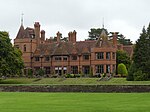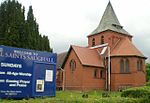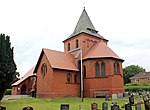Sealand is a community in Flintshire and electoral ward, north-east Wales, on the edge of the Wirral peninsula. It is west of the city of Chester, England, and is part of the Deeside conurbation on the Wales-England border. At the 2001 Census, it had a population of 2,746 (1,342 males, 1,404 females), increasing to 2,996 at the 2011 census. The community includes the villages of Garden City and Sealand, and the settlements of Higher Ferry, Sealand Manor and Sealand Road.Sealand Manor was established by the Welsh Land Settlement Society in 1937 as an agricultural settlement. The local Society was wound up in 1961, after which the leases of the homes passed to Hawarden Rural District Council.
Sealand is on flat land formed by land reclamation of part of the head of the estuary of the River Dee which had become heavily silted-up. It is on the A548 road, near the Chester dormitory communities of Blacon and Saughall and is a popular place of residence for people from both sides of the Welsh/English border. Welsh-medium primary education is available three miles away at Ysgol Croes Atti's Shotton site (opened in 2014) whilst Welsh-medium secondary education is available nine miles away in Mold at the long established Ysgol Maes Garmon.
The River Dee flowed to the sea along the current border between Wales and England, until in the 18th century it was diverted into its present channelized course to try to improve ship access from the sea to Chester. That led to extensive land reclamation in the head of the Dee estuary. The River Dee Company (1741-1902) had a right to reclaim the marshes and build embankments following the re-alignment of the Dee.










